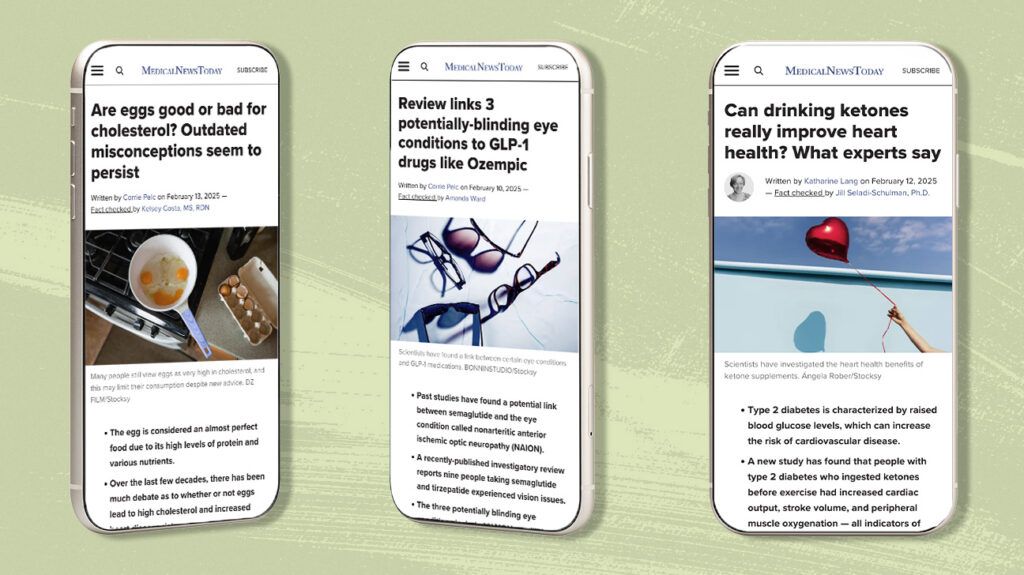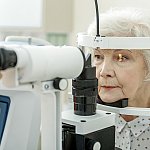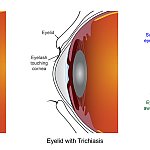
Among our coverage of peer-reviewed research and preliminary findings this week, a few studies and reviews have particularly stood out.
We’ve curated this roundup to give our readers a snippet of what’s happening in the health and wellness space, accompanied by expert commentary for those who want to learn more.
Here are this week’s picks and some further reading suggestions among the latest medical news.
The debate over whether eating eggs leads to high cholesterol and increases heart disease risk has been ongoing for decades.
According to the
The now-outdated daily recommended limit was
However, a recent study showed that people still believe in outdated misconceptions about eggs, preventing them from including them in their daily diets. The study highlighted that eggs do not have a major impact on overall cholesterol levels.
Experts, including Kelsey Costa, MS, RDN, registered dietitian nutritionist and founder of Dietitian Insights, have noted that eggs are a great source of protein and various micronutrients.
“Eggs are a good source of lean protein and many essential micronutrients, including folate, vitamin A, B2 (riboflavin), B5, B12, phosphorus, and selenium,” Costa told Medical News Today.
She also underscored that how eggs are produced and cooked can affect the potential benefits or harm related to eating them.
Limiting eggs and monitoring cholesterol consumption was first promoted in 1968 by the AHA.
The whole discussion received renewed attention in 2015 when the Dietary Guidelines for Americans (DGA) removed the daily limit on egg consumption over cholesterol concerns.
“At the time, it was thought that dietary cholesterol (i.e. the cholesterol found in eggs) could raise levels of
Speaking of cholesterol, another recent study found that there can be too much of a good thing. This study, which was published in the British Journal of Ophthalmology, indicated that older adults over the age of 55 may have a heightened risk of developing glaucoma if they had high levels of HDL cholesterol.
The findings were divisive with one expert, Yu-Ming Ni, MD, he would have expected higher “good” cholesterol (HDL-C) to be associated with lower rates of glaucoma, and higher “bad” cholesterol (LDL-C) associated with higher rates of glaucoma.
And if you are curious about why doctors refer to “good” and “bad” cholesterol, read this.
Although GLP-1 medications have become synonymous with weight loss, despite their main objective to treat type 2 diabetes, research into the benefits and harms of this class of drugs is growing each day.
The latest addition to the evidence is a review of its effects on eye health, with a few cases leading to potentially blinding eye conditions.
As part of this review, researchers discovered that nine people taking semaglutide and
Study author Bradley Katz, MD, PhD told us that:
“Between 2-3% of the U.S. population received a prescription for one of these medications in 2023. Because so many people are using these medications, it’s critical to monitor any ill effects on the eye or other parts of the body.”
The researchers have hypothesized that rapid changes in blood sugar levels might contribute to these complications, although the exact reason is still unclear.
On a more positive note, new research also recently found a link between chronic obstructive pulmonary disease (COPD) symptoms and GLP-1 medications.
The study found people with type 2 diabetes who are receiving treatment with GLP-1 and SGLT-2 medications have a lower risk of having COPD symptom flare-ups compared to those taking DPP-4 drugs.
The ketogenic diet, characterized by low carbohydrates and high fat consumption, has become increasingly popular over the last decade or so. As a result, ketone drinks or supplements have boomed.
One recent study decided to investigate whether ketones could improve heart function.
The researchers observed that heart function was better after people drank the ketone drink than after the placebo in all the participants, both when resting and when undertaking moderate exercise.
The specific indicators of this improvement were: increased cardiac output, stroke volume, and peripheral muscle oxygenation.
Although, at first glance, it is easy to overestimate the findings and assume they apply to everyone, this study’s participants were a very specific group: older adults with type 2 diabetes. And there were only 13 people.
The study authors said they were exploring the dose-response relationship of a ketone drink and heart function in healthy individuals.
Although initially recommended for people with epilepsy, many researchers have also been looking into the keto diet’s potential to treat autoimmune diseases, such as lupus or arthritis. At MNT, we dedicated a podcast episode to this.
In this episode and the accompanying feature, we invited a patient with lived experience to see if this worked in real life while discussing the potential mechanisms with a researcher.





